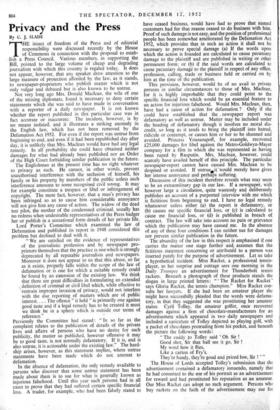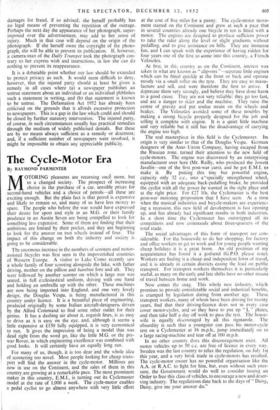Privacy and the Press
By C. J. SLADE THE issues of freedom of the Press and of editorial responsibility were discussed recently by the House of Commons in connection with the proposal to estab- slish a Press Council. Various members, in supporting the Bill, pointed to the large volume of cheap and degrading journalism with which this country is regaled today. It does not appear, however, that any speaker drew attention to the large measure of protection afforded by the law, as it stands, to newspaper-proprietors who publish matter which is not only vulgar and debased but is also known to be untrue.
Not very long ago Mrs. Donald Maclean, the wife of one of the missing diplomats, found it necessary to deny certain statements which she was said to have made in conversation with a reporter of a daily newspaper. It is not known whether the report published in this particular case was in fact accurate or inaccurate; The incident, however, is by no means isolated, and it illustrates a striking anomaly in the English law, which has not been removed by the Defamation Act 1952. For even if the report was untrue from beginning to end, and even if it had been republished day after day, it is unlikely that Mrs. Maclean would have had any legal remedy. In all probability she could have obtained neither damages for what had already been published nor an Order of the High Court forbidding similar publication in the future.
The Englishman at the present time has no right whatever to privacy as such. He cannot, in other words, prevent unauthorised interference with the seclusion of himself, his family or his property by members of the public unless such interference amounts to some recognised civil wrong. It may for example constitute a trespass or libel or infringement of copyright. The mere fact, however, that a man's privacy has been infringed so as to cause him considerable annoyance will not give him any cause of action. The widow of the dead test pilot, the mother of the condemned criminal, usually has no redress when undesirable representatives of the tress badger her or publish in a sensational form details of her private life. Lord Porter's Committee which examined the law of Defamation and published its report in 1948 considered this problem but declined to deal with it. " We are satisfied on the evidence of representatives of the journalistic profession and. by newspaper pro- prietors themselves that the practice is one which is strongly deprecated by all reputable journalists and newspapers. Moreover it does not appear to us that this abuse, so far as it exists, properly falls within the scope of the law of defamation or is one for, which a suitable remedy could be' found by an extension of the existing law. We think that there are great difficulties in formulating an extended definition of criminal or civil libel which, while effective to svestrain improper invasion of privacy, would not interfere with the due reporting of matters which are of public interest. ... The offence " it held " is primarily one against good taste and if a legal remedy has to be created it must we think be in a sphere which is outside our terms of reference." t Previously the Committee had stated : " In so far as the complaint relates to the publication of details of the private lives and affairs of persons who have no desire for such publicity, the matter so published, however offensive it may be to good taste, is not normally defamatory. If it is, and is also untrue, it is actionable under the existing law." The hard- ship arises, however, as this statement implies, where untrue statements have been made which do not amount to defamation.
In the absence of defamation, the only remedy available to persons who discover that some untrue statement has been made about them is to sue for what is generally known as injurious falsehood. Until this year such persons had in all cases to prove that they had suffered certain specific financial loss. A trader, for example, who had been falsely stated to have ceased business, would have had to prove that named customers had for that reason ceased to do business with him. Proof of such damage is not easy, and the position of professional people has been somewhat ameliorated by the Defamation Act 1952, which provides that in such an action it shall not be necessary to prove special damage (a) If the words upon which the action is founded are calculated to cause pecuniary damage to the plaintiff and are published in writing or other permanent form; or (b) if the said words are calculated to cause pecuniary damage' to the plaintiff in respect of any office, profession, calling, trade or business held or carried on by him at the time of the publication.
This provision, however, would be of no avail to private persons in similar circumstances to those of Mrs. Maclean, for it is highly improbable that they could point to the specific. financial loss which would be an essential feature to an action for injurious falsehood. Would Mrs. Maclean, then, have had a cause of action for defamation ? . Only if she could have established that the , newspaper report was defamatory as well as untrue. Matter may be included under the heading of defamatory though it involves no moral dis- credit, so long as it tends to bring the plaintiff into hatred, ridicule or contempt, or causes him or her to be shunned and avoided. Princess Youssoupoff, for example, recovered £25,000 damages for libel against the Metro-Goldwyn-Mayer company for a film in which she was represented as having been raped by Rasputin. Mrs. Maclean, however, could scarcely have availed herself of this principle. The particular newspaper-report cannot have caused Mrs. Maclean to be despised or avoided. If untruesit—would merely have given her intense annoyance and perhaps suffering.
Discussion of this incident therefore reveals what may seem to be an extraordinary gap in our law. If a newspaper, with however large a circulation, quite wantonly and deliberately publishes an account of a purported interview with me which is fictitious from beginning to end, I have no legal remedy whatsoever unless either (a) the report is defamatory, or (b) causes me specific financial loss, or (c) is calculated to cause me financial loss, or (d) is published in breach of contract. The law will take into account no pain or grievance which the publication may have caused me. In the absence of any of these four conditions I can neither sue for damages nor prevent similar publication in the future.
The absurdity of the law in this respect is emphasised if one carries the matter one stage further and., assumes that the fictitious statement concerning or attributed to a person was inserted purely for the purpose of advertisement. Let us take a hypothetical incident. Miss Racket, a professional tennis- player, to her surprise and outrage sees one morning in the Daily Trumpet an advertisement for Thunderbolt tennis rackets. Beneath a photograph of these products stands the slogan in large printed letters : " The Racket for Racket' says Gloria Racket, the tennis champion." Miss Racket con- sults her lawyers. If she had been an amateur player she might have successfully pleaded that the words were defama- tory, in that they suggested she was prostituting her amateur status. Cyril Tolley, the amateur golfer, once recovered damages against a firm of chocolate-manufacturers for an advertisethent which appeared in two daily newspapers and included a caricature of Tolley depicted as playing golf, with a packet of chocolates protruding from his pocket, and beneath the picture the following words : - " The caddy to Tolley said ' Oh Sir !
Good shot, Sir that ball see it go, Sir !
My word how it. flies, Like a carton of Fry's.
They're handy, they're good and priced low, Sir ! ' " The House of Lords accepted Tolley's submission that 4he advertisement contained a defamatory innuendo, namely that he had consented to the use of his portrait as an advertisement for reward and had prostituted his reputation as an amateur. Our Miss Racket can adopt no such argument. Persons who buy rackets on the faith of the advertisement may sue for damages for fraud, if so advised; she herself probably has no legal means of preventing the repetition of the outrage. Perhaps the next day the appearance of her photograph, super- imposed over the advertisement, may add to her sense of injury. Much in that case will depend on the origin of the photograph. If she herself owns the copyright of the photo- graph, she will be able to prevent its publication. If, however, a camera-man of the Daily Trumpet took the photograph con- trary to. her express wish and instructions, in law she can do nothing to prevent its reappearance.
It is a debatable point whether our law should be extended to protect privacy as such. It would seem difficult to deny, however, that the injured party should at least be given a remedy in all cases where (a) a newspaper publishes an untrue statement about an individual or an individual publishes such a statement in writing, and (b) that statement is known to be untrue. The Defamation Act 1952 has already been criticised on the grounds that it affords excessive protection to newspapers. This is a gap in the law which could and should be closed by further statutory intervention. The injured party, of course, in such circumstances usually has practical remedies through the medium of widely publicised denials. But these are by no means always sufficient as .a remedy or deterrent; and, if a sufficient number of newspapers were involved, it might be impossible to obtain any appreciable publicity.



































 Previous page
Previous page